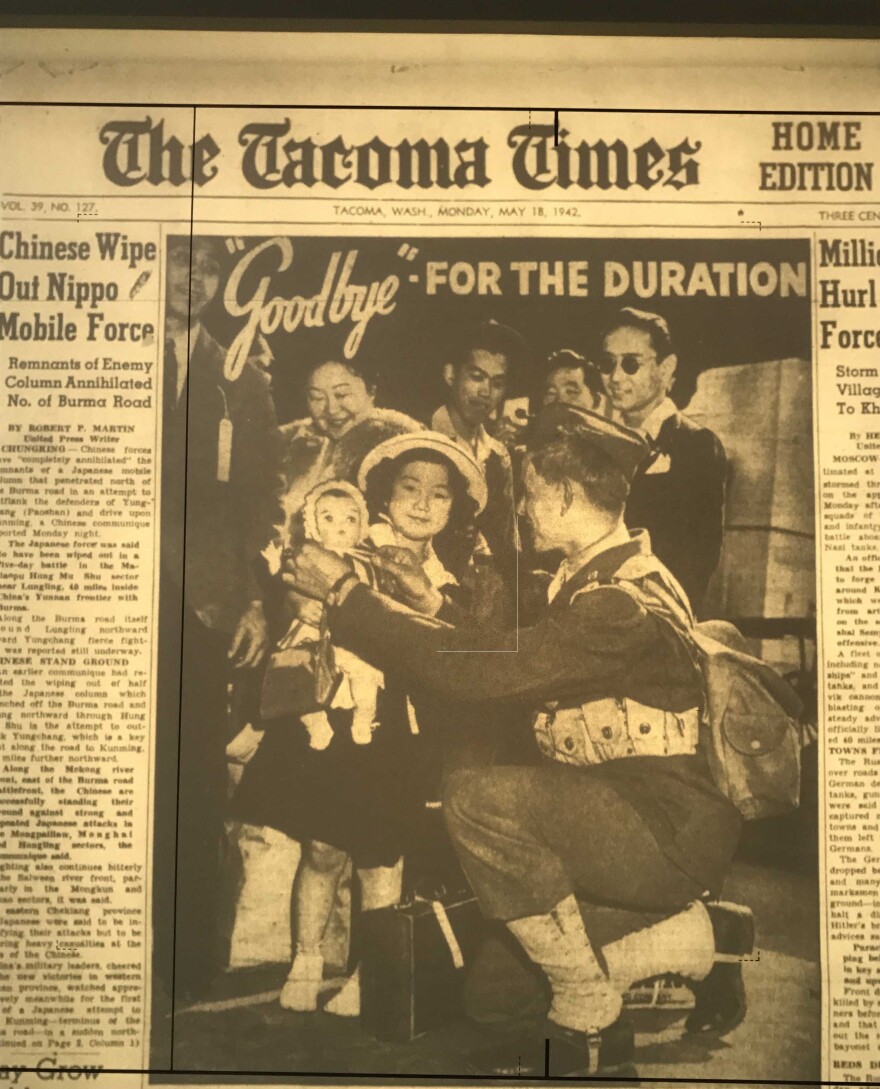Tacoma was once home to vibrant Japanese-American neighborhood full of photo studios, barbershops, and families. That was before almost 900 people of Japanese ancestry were forcibly removed from the city 75 years ago this week.
They gathered at Tacoma's Union Station and headed to Pinedale Assembly Center near Fresno, Calif. An executive order signed by President Franklin D. Roosevelt had authorized his secretary of war to designate military zones along the West Coast, clearing the way for the mass incarceration of Japanese-Americans.
Elsewhere on the West Coast, "Japantown" enclaves weathered the internment period and survive to this day. Not so in Tacoma, where the years of mass incarceration all but dissolved the neighborhood, which once occupied a significant portion of downtown.

Tacoma residents are marking the 75th anniversary of the Japanese-Americans' removal with a Day of Remembrance on Thursday.
KNKX reporter Will James spoke with two of the event's organizers, writer Tamiko Nimura and historian Michael Sullivan, about the disappearance of Tacoma's Japantown.
Did the internment of Japanese-Americans play out any differently in Tacoma than in other West Coast cities?
Michael Sullivan: "The Japanese-American community in Tacoma were moved on quickly because of the nearness to Fort Lewis and the strategic concerns about sabotage and fear-infused thoughts that were going on around here after the bombing of Pearl Harbor in December of 1941. And it's almost impossible for us to recreate the period, the time. The United States had never experienced any direct military assault on that level on American soil. So that was the atmosphere. That was the maelstrom that our neighborhood was caught up in."
What did it feel like to learn this history?

Tamiko Nimura: "I knew nothing about this history when I moved to Tacoma in 2004. And, really, I did not know that we had an entire Japantown until 2014, so some 10 years later. It just really sent me into a little period of mourning for a while. It was so much. There were photo studios, sweet shops. This is not a community that is sort of just barely struggling to get by. It was an organized community. They had barber shops and unions for the barbers. The vibrancy of the community just goes to show you what that first generation lost when they went to camp."
Why did Japantowns survive in other cities while Tacoma's disappeared?
Michael Sullivan: "Tacoma had the misfortune of being [the district of] probably the most militant policy maker in the country in 1920. Albert Johnson happened to be the congressman from there. What that led to was strict enforcement of property ownership and citizenship. The Japanese merchants and residents here couldn't own their shops. They couldn't own their houses. They couldn't own the farmland that they were making a living off of. So when the Japanese-American community were sent away for three, four, five years, the buildings that they didn't own either deteriorated rapidly or were filled with another rent-paying tenant."
What is the value of remembering this history today?

Michael Sullivan: "I think there's some obvious parallels with just executive orders and just the way we seem to turn to immigration policy or to the condition of others as a way of solving big problems."
What lessons should we take from these events?
Tamiko Nimura: "One of the things I've been thinking about a lot lately, because my own dad and his family were incarcerated at Tule Lake, which is where a lot of the Tacoma Japanese went, is the impact that our actions now can have for generations. It's their fates and their kids' fates and their grandkids' fates. I wasn't even at camp. Camp history will still affect me physically to this very day in ways that I could never have predicted or asked for."








